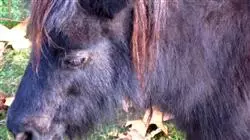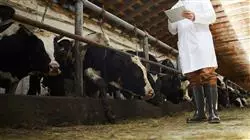University certificate
Scientific endorser

The world's largest faculty of veterinary medicine”
Introduction to the Program
Become one of the most demanded professionals of the moment with this complete Postgraduate certificate in Criminal Veterinary Expertise"

The current social need for professionals specialized in the expertise in legal proceedings requires specific training from an eminently practical perspective, and veterinary medicine is no exception. The current social need for professionals specialized in the expertise in legal proceedings requires specific training from an eminently practical perspective, and veterinary medicine is no exception. The more scientific support a legal decision has, the more justice it will impart.
This is precisely the reason for the creation of this Postgraduate certificate in Criminal Veterinary Expertise, in which we count on the collaboration of authors directly related to Judicial Expertise with more than enough professional and teaching experience. Experts from Schools of Legal Practice, Masters of Access to the Legal Profession, Faculty of Veterinary Medicine, who have previously taught Judicial Expert Training Courses in the Veterinary field.
The Postgraduate certificate will analyze in detail all the questions that may arise for a Veterinary Graduate who intends to enter the world of expertise in Courts. The objective of this training is to take the veterinary professionals through a complete development, enabling them through a solid training to be able to intervene with judgment and responsibility in any legal proceeding to which they may be called.
Get a complete and adequate qualification in veterinary judicial expertise and open new paths to your professional progress"
This Postgraduate certificate in Criminal Veterinary Expertise offers you the characteristics of a program of high scientific, teaching and technological level. These are some of its most notable features:
- The latest technology in online teaching software
- A highly visual teaching system, supported by graphic and schematic contents that are easy to assimilate and understand
- Practical cases presented by practising experts
- State of the art interactive video systems
- Teaching supported by telepractice
- Continuous updating and recycling systems
- Autonomous learning: full compatibility with other occupations
- Practical exercises for self evaluation and learning verification
- Support groups and educational synergies: questions to the expert, debate and knowledge forums
- Communication with the teacher and individual reflection work
- Content that is accessible from any fixed or portable device with an Internet connection
- Supplementary documentation databases are permanently available, even after the course
With a methodological design that relies on teaching techniques proven for their effectiveness, this Postgraduate certificate in Criminal Veterinary Expertise will take you through different teaching approaches to allow you to learn in a dynamic and effective way
Our teaching staff is made up of professionals from different fields related to this specialty. In this way, we ensure that we provide you with the training update we are aiming for. A multidisciplinary team of professionals trained and experienced in different environments, who will cover the theoretical knowledge in an efficient way, but, above all, will put the practical knowledge derived from their own experience at the service of the course: one of the differential qualities of this training.
This mastery of the subject is complemented by the effectiveness of the methodological design of this Postgraduate certificate in Criminal Veterinary Expertise. Developed by a multidisciplinary team of e-Learning experts, it integrates the latest advances in educational technology. This way, you will be able to study with a range of comfortable and versatile multimedia tools that will give you the operability you need in your training.
The design of this program is based on Problem Based Learning: an approach that conceives learning as a highly practical process. To achieve this remotely, we will use telepractice learning: with the help of an innovative interactive video system, and learning from an expert, you will be able to acquire the knowledge as if you were actually dealing with the scenario you are learning about. A concept that will allow you to integrate and fix learning in a more realistic and permanent way.
With the experience of professionals from the judiciary, prosecution, law, veterinary and university fields"

A Postgraduate certificate in Criminal Veterinary Expertise that will allow you to acquire all the necessary knowledge in this area"
Why study at TECH?
TECH is the world’s largest online university. With an impressive catalog of more than 14,000 university programs available in 11 languages, it is positioned as a leader in employability, with a 99% job placement rate. In addition, it relies on an enormous faculty of more than 6,000 professors of the highest international renown.

Study at the world's largest online university and guarantee your professional success. The future starts at TECH”
The world’s best online university according to FORBES
The prestigious Forbes magazine, specialized in business and finance, has highlighted TECH as “the world's best online university” This is what they have recently stated in an article in their digital edition in which they echo the success story of this institution, “thanks to the academic offer it provides, the selection of its teaching staff, and an innovative learning method aimed at educating the professionals of the future”
A revolutionary study method, a cutting-edge faculty and a practical focus: the key to TECH's success.
The most complete study plans on the university scene
TECH offers the most complete study plans on the university scene, with syllabuses that cover fundamental concepts and, at the same time, the main scientific advances in their specific scientific areas. In addition, these programs are continuously being updated to guarantee students the academic vanguard and the most in-demand professional skills. In this way, the university's qualifications provide its graduates with a significant advantage to propel their careers to success.
TECH offers the most comprehensive and intensive study plans on the current university scene.
A world-class teaching staff
TECH's teaching staff is made up of more than 6,000 professors with the highest international recognition. Professors, researchers and top executives of multinational companies, including Isaiah Covington, performance coach of the Boston Celtics; Magda Romanska, principal investigator at Harvard MetaLAB; Ignacio Wistumba, chairman of the department of translational molecular pathology at MD Anderson Cancer Center; and D.W. Pine, creative director of TIME magazine, among others.
Internationally renowned experts, specialized in different branches of Health, Technology, Communication and Business, form part of the TECH faculty.
A unique learning method
TECH is the first university to use Relearning in all its programs. It is the best online learning methodology, accredited with international teaching quality certifications, provided by prestigious educational agencies. In addition, this disruptive educational model is complemented with the “Case Method”, thereby setting up a unique online teaching strategy. Innovative teaching resources are also implemented, including detailed videos, infographics and interactive summaries.
TECH combines Relearning and the Case Method in all its university programs to guarantee excellent theoretical and practical learning, studying whenever and wherever you want.
The world's largest online university
TECH is the world’s largest online university. We are the largest educational institution, with the best and widest online educational catalog, one hundred percent online and covering the vast majority of areas of knowledge. We offer a large selection of our own degrees and accredited online undergraduate and postgraduate degrees. In total, more than 14,000 university degrees, in eleven different languages, make us the largest educational largest in the world.
TECH has the world's most extensive catalog of academic and official programs, available in more than 11 languages.
Google Premier Partner
The American technology giant has awarded TECH the Google Google Premier Partner badge. This award, which is only available to 3% of the world's companies, highlights the efficient, flexible and tailored experience that this university provides to students. The recognition as a Google Premier Partner not only accredits the maximum rigor, performance and investment in TECH's digital infrastructures, but also places this university as one of the world's leading technology companies.
Google has positioned TECH in the top 3% of the world's most important technology companies by awarding it its Google Premier Partner badge.
The official online university of the NBA
TECH is the official online university of the NBA. Thanks to our agreement with the biggest league in basketball, we offer our students exclusive university programs, as well as a wide variety of educational resources focused on the business of the league and other areas of the sports industry. Each program is made up of a uniquely designed syllabus and features exceptional guest hosts: professionals with a distinguished sports background who will offer their expertise on the most relevant topics.
TECH has been selected by the NBA, the world's top basketball league, as its official online university.
The top-rated university by its students
Students have positioned TECH as the world's top-rated university on the main review websites, with a highest rating of 4.9 out of 5, obtained from more than 1,000 reviews. These results consolidate TECH as the benchmark university institution at an international level, reflecting the excellence and positive impact of its educational model.” reflecting the excellence and positive impact of its educational model.”
TECH is the world’s top-rated university by its students.
Leaders in employability
TECH has managed to become the leading university in employability. 99% of its students obtain jobs in the academic field they have studied, within one year of completing any of the university's programs. A similar number achieve immediate career enhancement. All this thanks to a study methodology that bases its effectiveness on the acquisition of practical skills, which are absolutely necessary for professional development.
99% of TECH graduates find a job within a year of completing their studies.
Postgraduate Certificate in Criminal Veterinary Expertise
If you are passionate about the protection of animal rights and want to actively contribute to the fight against animal abuse and crimes against animals, the Postgraduate Certificate in Criminal Veterinary Expertise from TECH Global University is the perfect choice for you. This program gives you the opportunity to develop specific skills in the investigation and resolution of cases related to crimes against animals. At TECH Global University, we are committed to academic excellence and the continuous training of professionals. Our program is taught through online classes, which allows you to access the content from anywhere and at any time. This modality gives you the flexibility you need to adapt your studies to your schedule and reconcile your personal and professional life.
Develop your skills in Criminal Investigation of Crimes against Animals.
During the program, you will learn the techniques and methodologies necessary to perform veterinary expert examinations, collect forensic evidence, analyze biological samples and write solid and convincing expert reports. Our team of highly trained faculty will guide you through real case studies and provide you with the tools necessary to conduct effective investigations and contribute to the prosecution of perpetrators. You will be able to work in collaboration with security agencies, law enforcement, prosecutors and animal protection organizations, providing your expertise and contributing to justice and animal welfare. Enroll in TECH Global University's Postgraduate Certificate in Criminal Veterinary Expertise and become an expert in the criminal investigation of animal crimes - get started on your path to a more just and compassionate society today!







